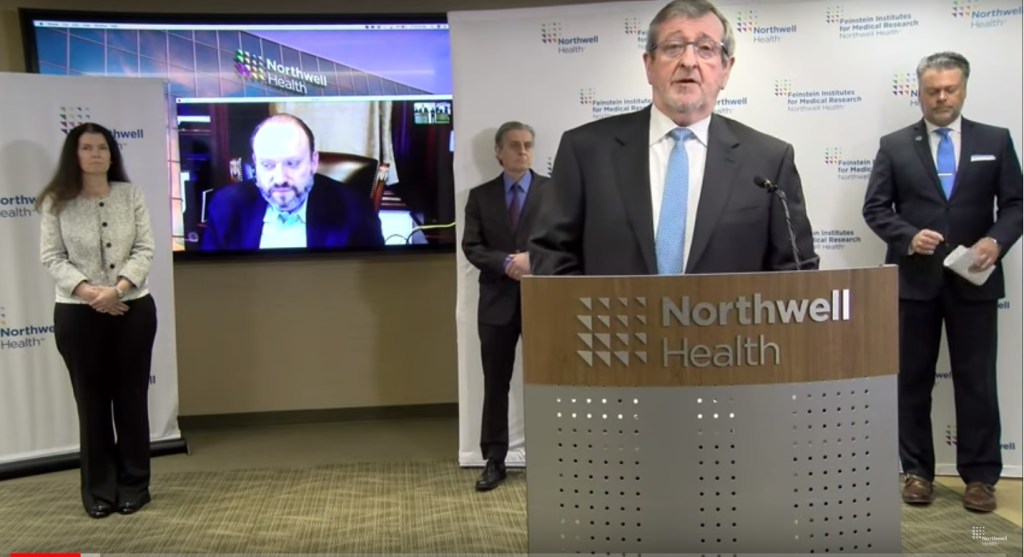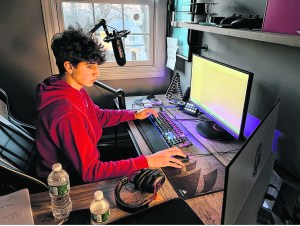In an effort to battle the current pandemic and help patients, Northwell Health has begun clinical trials of two medications designed to treat COVID-19, including one that seeks to attack the virus directly and another that targets the body’s own response.
The 23-hospital system said it was able to begin three trials, including two for one medication, in only four days, even though the process, including federal approvals, usually takes months.
“We’re all living in a new reality,” Northwell Health President and CEO Michael Dowling said of the system, doing about 1,000 COVID-19 tests a day as of March 20 and planning to increase that number.
The trials, in which people are already being enrolled, are being done through Northwell’s Feinstein Institutes for Medical Research at the system’s hospitals, which were treating 250 patients suffering from COVIC-19 as of that date.
The clinical trials are not open to the general public, but are enrolling patients in Northwell facilities.
Northwell through its Feinstein Institutes of Clinical Research is partnering with Foster City, Calif.-based Gilead Sciences on two clinical trials, looking at the safety and efficacy of remdesivir or RDV, an antiviral drug, to reduce the intensity and duration of COVID-19 in hospitalized patients.
The system said RDV already demonstrated “positive effects on other viral pathogens” such as MERS and SARS.
The first trial can accommodate up to 400 severe cases of COVID-19 globally with Dr. Marcia Epstein, Feinstein Institutes researcher and an infectious disease expert, as Northwell’s lead investigator.
Northwell also is taking part in a phase 3 study of RDV trial with Gilead that will look at up to 600 patients with moderate COVID-19 globally. Dr. Prashant Malhorta, assistant professor in the Institute of Health Innovations and Outcomes Research at Feinstein, is lead investigator on that.
Northwell Health also initiated a third trial with up to 400 patients along with Eastview, N.Y.-based Regeneron Pharmaceuticals and Paris-based Sanofi regarding the safety and efficacy of sarilumab.
Northwell Health described that study as focusing on “a human antibody that may prevent the activity” of interleukin-6 or IL-6 that may cause severe pneumonia in some COVID-19 patients.
Dr. Negin Hajizadeh, assistant professor in the Institute of Health Innovations and Outcomes Research at Feinstein, is the lead investigator for that study.
The Feinstein Institutes includes 50 research labs, 2,500 clinical research studies and 5,000 researchers and staff, making it a key center for developing many medications. The Feinstein Institutes also makes many clinical studies available to Long Islanders, by using Northwell Health patients.
Rapid Response
Clinical trials traditionally take far longer to organize, although even now it’s not clear how long it could take to get definitive results.
“This is an unprecedented time for the world,” said Dr. David Weinreich, Regeneron’s senior vice president, head of global clinical development and co-head of global development. “It’s only through a huge collaboration that the wonderful resources in the United States have stepped forward to try and combat this disease.”
Clinical trials in part proceed through a slower process, because there is less focus on a single disease or threat with thousands taking place at any one time.
“It took us only four days to get these trials up and running,” Northwell Health Chief Medical Officer Dr. David Batinelli said.
Others in a press conference attended virtually through YouTube also said they never saw a clinical trial launch so rapidly.
“In my over 20 years of being part of clinical research, we have never been able to move this quickly before,” Dr. Christina Brennan, vice president of clinical research at the Feinstein Institutes, said. “It certainly takes a village to keep this moving.”
She said that due to the “severity of the current outbreak,” Northwell “knew the importance of all working together quickly.”
Across the nation, most other clinical trials have been put on enrollment hold, amid concerted efforts to battle COVID-19, Brennan added.
“The focus now has really turned to COVID-19 treament trials,” she said of what she called an “all hands on deck” approach that at times sounded like a medical moon landing or medical Marshall Plan.
The United States Food and Drug Administration as well as state officials and Sanofi, partnering with Reneron, have been working together. U.S. F.D.A. officials, for instance, have been working long hours and on weekends to speed approvals.
“If it wasn’t for all the doctors, nurses, scientists taking care of these patients, putting themselves in harm’s way, none of this would be possible,” Weinrich said.
How it Happened
The first two Northwell patients were given doses on Wed. March 17, St. Patrick’s Day, for the sarilumab trial, Brennan said.
Dr. Kevin Tracey, president and CEO of the Feinstein Institutes for Medical Research and chair of Northwell Health’s COVID-19 clinical trials, said Northwell expects to enroll its first patients in the remdesivir trial on March 20 or 21.
Patients already have been enrolled in the remdesivir trial in Washington state and are being enrolled in the sarilumab trial through the Mt. Sinai Health System.
Tracey said the system last Friday “became acutely aware of patients in our hospitals who were very ill and needed additional options for therapy.”
Northwell reached out to Gilead and Regeneron and in what he called an around the clock effort set up clinical trials at “Northwell to serve patients” and provide other options for therapy.
“We’ve done the work in a few days that normally takes months,” Tracey added. “We did this, because our patients need options.”
Tracey said these drugs already have been tested around the world, sometimes showing encouraging signs.
“There is hope that drugs used in China, South Korean, Norway and elsewhere have shown signals that patients may benefit,” Tracey said.
He added that so far information that these medications could help treat COVID-19 has been anecdotal through non-FDA approved studies.
Tracey said it’s important to have “careful clinical trials under FDA guidelines with world class pharmaceutical partners” to give hope to patients and families and learn “if these drugs hold the promise that we hope and pray they do.”
While the Gilead drug seeks to target COVID-19 directly, Regeneron’s takes a very different approach, focusing on the body’s immune system.
Weinrich said interleukin-6 or IL-6 produces a fever as it seeks to battle threats and the body’s own response, in other words, becomes dangerous.
“Sometimes this normal system goes into overdrive and you can develop significant disease as a result of a runaway immune system,” he said.
Early data out of China, Weinrich said, indicates that blocking IL-6 receptors might block the body’s inflammatory response in lungs, which can make it difficult to breathe.
“This same pathway is also active in a number of other diseases,” Weinrich said, citing rheumatoid arthritis. “While this initial data coming out of China was very encouraging, there was no control and we don’t know how patients were selected.”
Patients and Protocols
Patients are being selected and enrolled in the studies based on the clinical protocols for the two trials.
“The goal of the clinical trials unit is first and foremost to stand up clinical trials for people who are critically ill in the intensive care units primarily,” Tracey said.
Dr. Weinreich said he’s not certain of the number of sites that will take part in the trials, including all sites, as it continues to expand. “We’re going to try to do as many sites as there are patients who need it and the operations group can manage,” he said.
Brennan cited the speed as a possible model for future clinical trials, although she said these were very specific circumstances.
“We would love this to be in the future the way to open clinical trials fast track,” Brennan said. “Usually the volume of trials coming in doesn’t allow trials to open in four days.”
Northwell Health hopes to identify additional trials that can be launched, providing early stage treatment trials to prevent people from becoming sicker.
Regeneron also hopes to open studies at other Greater New York area hospitals, such as New York-Presbyterian/Columbia University Medical Center as well as in Teaneck, N.J.
“We’ll be continuing to work day and night to continue to open sites around the country,” Weinrich said.
Tracey said work is going on around the world to develop a vaccine, but that could still easily be a year and a half away “Obviously, what’s needed long term for the world is a vaccine and that will come next,” Tracey said. “It’s how a disease can be eradicated.”
Regeneron, which also developed an antibody cocktail to target Ebola, is also working on an antibody to target COVID-19. “We hope that our expertise in antibodies will provide some benefit,” Weinrich said.



























